1.实验题目:
2-34 中文大写金额。
声明RMB人民币类如下,实现其中成员方法。
public class rMB // 人民币类
{
// 返回金额x的中文大写形式字符串,如x=123 45,转化为“壹佰贰拾叁元肆角伍分”
public static string tostring(double x)}
考虑以下多种数据情况实现算法。
①整数金额省略小数部分,添加“整” 字。例如,123 表示为“壹佰贰拾叁元整
② 若金额中含有连续的0,则只写一个 “零”。例如,10005 表示为“壹万零伍元
10 的省略表示形式。例如,110 表示为“壹佰壹拾元整”,而 10 则表示为“拾元
2.实验目的:
实现人民币大小写的转换(阿拉伯数字转汉字)
- 实验内容:
1.实验思路
将输入的阿拉伯数字金额转化为中文大写的形式。
通过声明RMB类,编写转化的处理机制。
针对题目中所给情况②设计了check()方法对零进行处理。
针对题目中所给情况①设计了toString()方法判断是否为整数,并判断所给数字有多少位,最后输出转换后的结果。
- 关键代码截图
(1)对零的处理
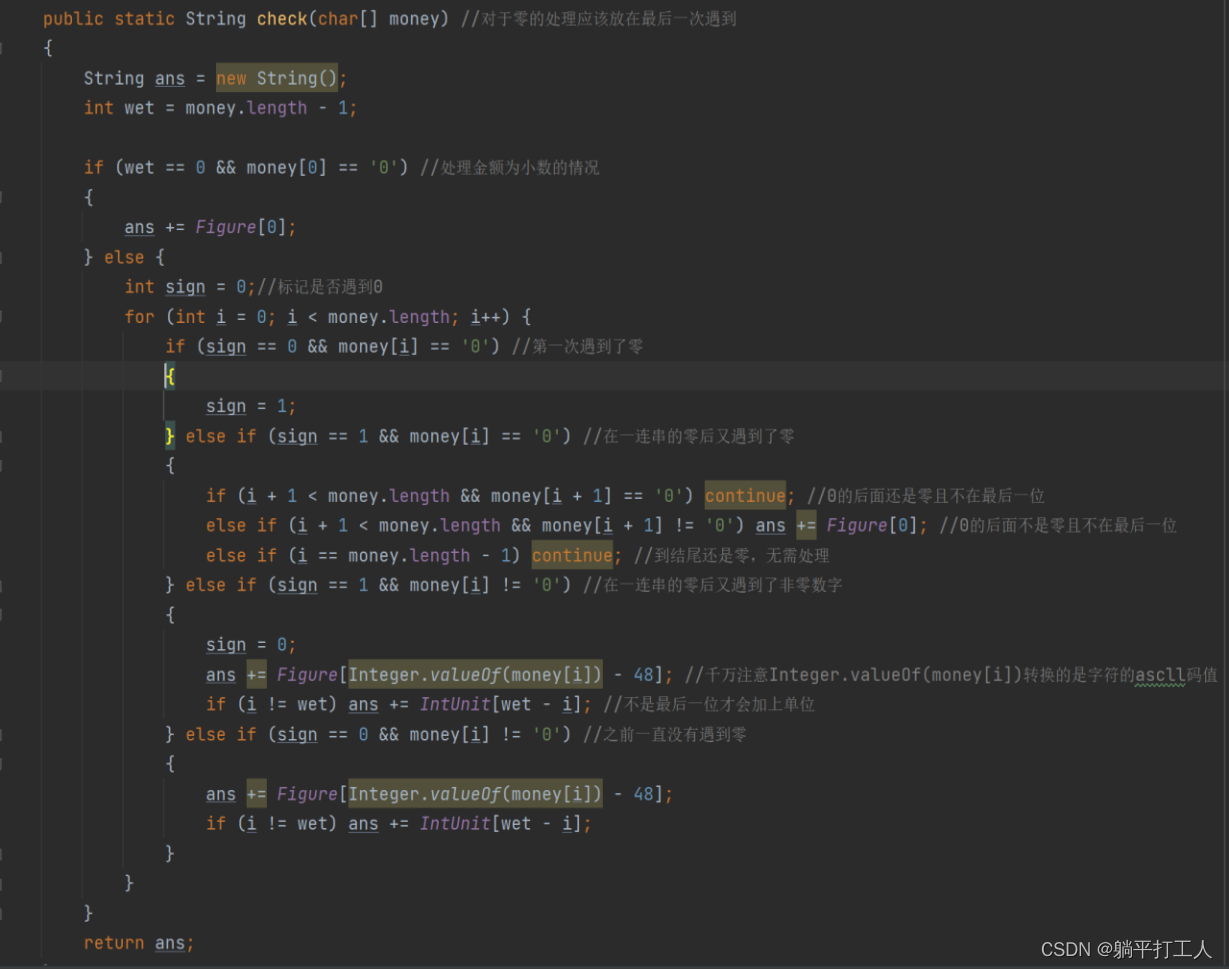
(2)判断是否为小数并获得小数点位置
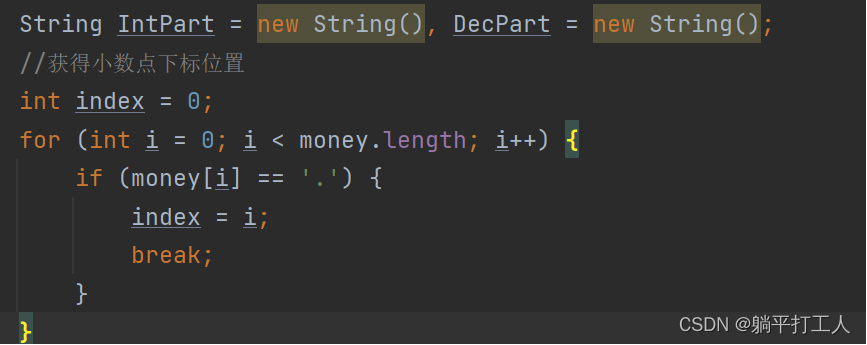
(3)判断是否为整数,并对整数情况进行处理

(4)对小数情况进行处理
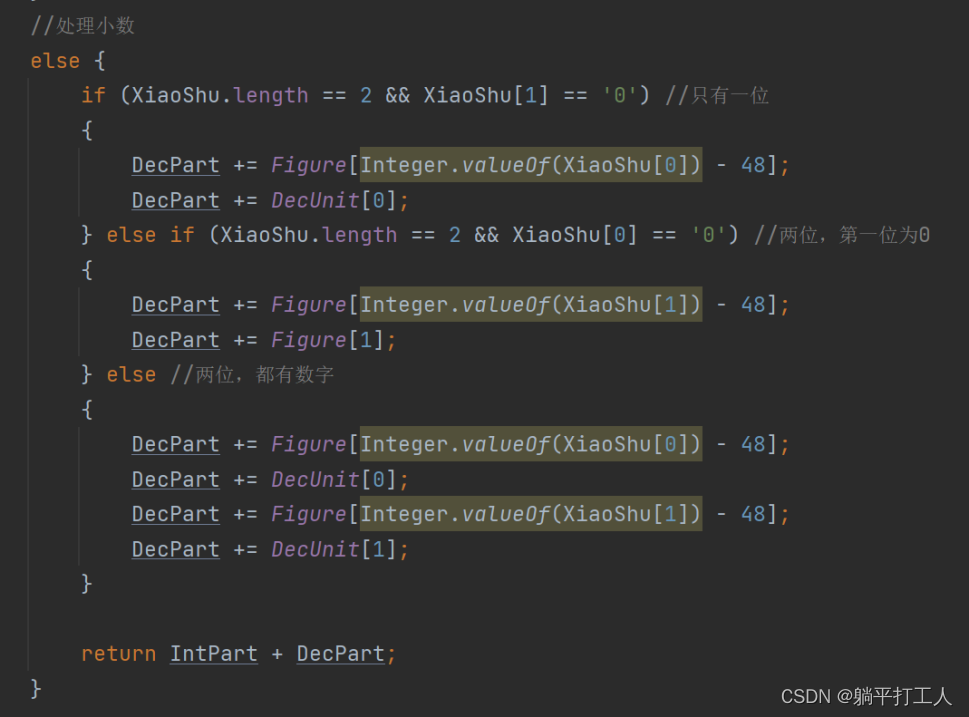
3.运行结果:
(1)对整数情况进行验证:
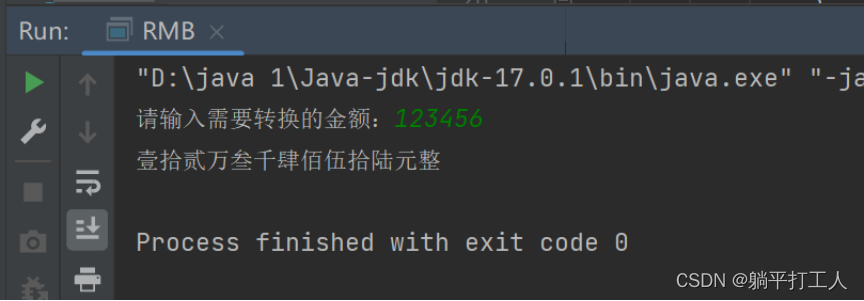
(2)对小数的情况进行验证:
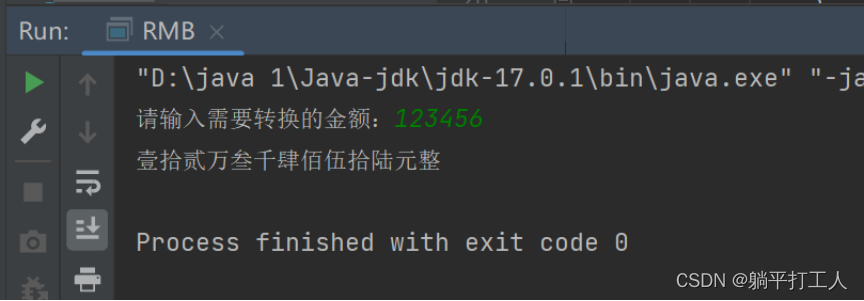
全部代码:
import java.text.DecimalFormat;
import java.util.Scanner;
public class RMB {
static char[] IntUnit = {'元', '拾', '佰', '千', '万', '亿'};
static char[] DecUnit = {'角', '分'};
static char[] Figure = {'零', '壹', '贰', '叁', '肆', '伍', '陆', '柒', '捌', '玖'};
public static String check(char[] money) //对于零的处理应该放在最后一次遇到
{
String ans = new String();
int wet = money.length - 1;
if (wet == 0 && money[0] == '0') //处理金额为小数的情况
{
ans += Figure[0];
} else {
int sign = 0;//标记是否遇到0
for (int i = 0; i < money.length; i++) {
if (sign == 0 && money[i] == '0') //第一次遇到了零
{
sign = 1;
} else if (sign == 1 && money[i] == '0') //在一连串的零后又遇到了零
{
if (i + 1 < money.length && money[i + 1] == '0') continue; //0的后面还是零且不在最后一位
else if (i + 1 < money.length && money[i + 1] != '0') ans += Figure[0]; //0的后面不是零且不在最后一位
else if (i == money.length - 1) continue; //到结尾还是零,无需处理
} else if (sign == 1 && money[i] != '0') //在一连串的零后又遇到了非零数字
{
sign = 0;
ans += Figure[Integer.valueOf(money[i]) - 48]; //千万注意Integer.valueOf(money[i])转换的是字符的ascll码值
if (i != wet) ans += IntUnit[wet - i]; //不是最后一位才会加上单位
} else if (sign == 0 && money[i] != '0') //之前一直没有遇到零
{
ans += Figure[Integer.valueOf(money[i]) - 48];
if (i != wet) ans += IntUnit[wet - i];
}
}
}
return ans;
}
public static String toString(double x) {
//将要转化的金额数字格式化
DecimalFormat df = new DecimalFormat("###0.00");
//将money[]转化为字符串
char[] money = df.format(x).toCharArray();
//定义转化后字符串的整数部分和小数部分
String IntPart = new String(), DecPart = new String();
//获得小数点下标位置
int index = 0;
for (int i = 0; i < money.length; i++) {
if (money[i] == '.') {
index = i;
break;
}
}
//获取整数金额
char[] Intpart_ = new char[index];
System.arraycopy(money, 0, Intpart_, 0, index);
int elength = 0, wlength = 0; //当存在亿位和万位时,记录其长度
if (Intpart_.length > 8) //亿
{
char[] temp = new char[Intpart_.length - 8];
elength = Intpart_.length - 8; //存在时记录亿位的长度
for (int i = 0; i < Intpart_.length - 8; i++)
temp[i] = money[i];
IntPart += check(temp);
IntPart += IntUnit[5];
}
if (Intpart_.length > 4) //万
{
if (Intpart_.length > 8) //存在亿
{
char[] temp = new char[4];
wlength = 4; //存在时记录万位的长度
for (int i = 0; i < 4; i++) temp[i] = money[elength + i];
IntPart += check(temp);
IntPart += IntUnit[4];
} else {
char[] temp = new char[Intpart_.length - 4];
wlength = Intpart_.length - 4; //存在时记录万位的长度
for (int i = 0; i < Intpart_.length - 4; i++) temp[i] = money[i];
IntPart += check(temp);
IntPart += IntUnit[4];
}
}
// 千
if (Intpart_.length > 4) //存在万
{
char[] temp = new char[4];
for (int i = 0; i < 4; i++) temp[i] = money[elength + wlength + i];
IntPart += check(temp);
IntPart += IntUnit[0];
} else {
char[] temp = new char[Intpart_.length];
for (int i = 0; i < Intpart_.length; i++) temp[i] = money[i];
IntPart += check(temp);
IntPart += IntUnit[0];
}
char[] XiaoShu = new char[money.length - index - 1];
System.arraycopy(money, index + 1, XiaoShu, 0, money.length - index - 1); //获取小数金额
//System.out.println(XiaoShu);
int isDigit = ((XiaoShu.length == 2) && (XiaoShu[0] == '0') && (XiaoShu[1] == '0')) ? 1 : 0; //金额是否是整数
if (isDigit == 1) //如果是整数
{
IntPart += '整';
return IntPart;
}
//处理小数
else {
if (XiaoShu.length == 2 && XiaoShu[1] == '0') //只有一位
{
DecPart += Figure[Integer.valueOf(XiaoShu[0]) - 48];
DecPart += DecUnit[0];
} else if (XiaoShu.length == 2 && XiaoShu[0] == '0') //两位,第一位为0
{
DecPart += Figure[Integer.valueOf(XiaoShu[1]) - 48];
DecPart += Figure[1];
} else //两位,都有数字
{
DecPart += Figure[Integer.valueOf(XiaoShu[0]) - 48];
DecPart += DecUnit[0];
DecPart += Figure[Integer.valueOf(XiaoShu[1]) - 48];
DecPart += DecUnit[1];
}
return IntPart + DecPart;
}
}
public static void main(String[] args) {
Scanner get = new Scanner(System.in);
System.out.print("请输入需要转换的金额:");
double num = get.nextDouble();
if (num == 0.0) System.out.println("零元整"); //处理特殊情况
else System.out.println(RMB.toString(num));
get.close();
}
}
本文含有隐藏内容,请 开通VIP 后查看